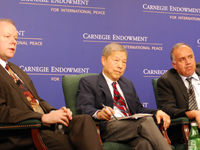Registration
You will receive an email confirming your registration.
IMGXYZ3370IMGZYXThe global economic outlook for 2012 and 2013 is exceptionally uncertain. The euro crisis continues to fester, global credit markets are tightening, and emerging markets are slowing down. Under these circumstances, can China carry the rest, despite a host of domestic as well as international risks? Will the fledgling recovery of the United States continue? Are policymakers doing enough to prevent a global recession? Hans Timmer of the World Bank joined Carnegie’s Pieter Bottelier, Uri Dadush, and Yukon Huang to discuss these questions.
A Disappointing 2011
Panelists agreed that while 2011 was not a disaster for the world economy, it was much weaker than forecast.
- The Euro Crisis: The euro crisis, which intensified in August, has already pushed several European countries into recession, stated Dadush. A continent-wide recession is expected by early next year.
- Japanese Earthquake: Timmer noted that the disruptions caused by the March 2011 earthquake in Japan were larger than initially anticipated.
- Emerging Market Slowdown: The effects from policy tightening policy in emerging markets, intended to prevent overheating, also slowed growth more than expected, Timmer added.
- Not a Disaster: Nevertheless, Dadush pointed out that world growth was in line with its pre-crisis trend.
The European Threat
The crisis in Europe, which spread to Italy in August, represents the biggest threat facing the world economy in 2012, panelists agreed. With little space for policy support in advanced countries, another deep financial crisis could be even more harmful than the one in 2008.
- No Good Outcomes: Dadush said that the best case Europe could hope for was a mild recession, but a full-fledged breakup followed by a long global recession remains a possibility.
- A Coordination Problem: Individual countries in Europe are too small and too integrated to address the crisis alone, Timmer said. More coordination is needed.
- Spillovers: Timmer noted that emerging markets have seen import demand collapse, capital flows slow and sometimes reverse, and confidence dwindle as the crisis has gotten worse.
- Solving the Crisis: Dadush argued that there has been little progress on a solution. Resolving the crisis will require more central bank lending and a bigger rescue fund, combined with long-term structural reforms, including eurobonds and new fiscal disciplines. With the crisis too big for Europeans to handle alone, the international community—particularly the United States—needs to provide more support to Europe, through the IMF, Dadush added.
- Chinese Support: Panelists agreed that China should help as well. China has an interest in a financially stable Europe, Timmer argued. Not only does China sell exports to Europe, but China also wants the euro to remain a feasible alternative to the dollar as an international reserve currency. However, Huang noted that transfers to Europe are politically unpopular and Bottelier argued that Chinese leaders see the crisis as a political one, not one that simply needs financial aid.
China’s Outlook
With growth slowing and property prices now slipping from high levels, many economists believe that China is a bubble about to burst. Panelists weighed in on China’s prospects.
- A Hard Landing: Huang noted that a growth of about 5–6 percent would represent a “hard landing” in China, which is currently growing at about 9.2 percent. Though growth is expected to be about 8 percent in 2012, growth is likely to be about one percentage point lower if European crisis intensifies.
- Reasons for Optimism: Bottelier said that the slowdown—which was in part engineered by policy makers worried about a property bubble—can be managed. Policymakers have not reversed their efforts to deflate the housing market; Huang also noted that pent-up demand from rural migrants moving to urban areas will keep property prices from falling sharply.
- Opportunity for Reform: Bottelier argued that Chinese leaders see the slowdown as an opportunity to promote high-value exports in China and shift toward an economy less reliant on investment and more reliant on consumption for growth.
Chinese Political Challenges
- Political Tensions: Huang stressed several factors, including concerns over land rights and high urban-rural inequality, which are creating political tensions. Unrest is particularly rising among younger generations, he added.
- Concerned about the Economy?: Bottelier pointed out that, while an economic slowdown would likely make these tensions worse, economic factors do not appear to be their primary cause. Social unrest has been growing recently, despite rapid economic growth.
- Changing Leadership: A new government will come into power in the fall of 2012, complicating predictions about Chinese politics, Bottelier added.
U.S.—China Relations
- Lack of Trust: Bottelier argued that the relationship between the United States and China is plagued by a lack of trust between the two countries.
- Chinese Doubt: Many Chinese are beginning to doubt the U.S. economic model because of the 2008 financial crisis, Bottelier added.
- The U.S. Pivot: Huang noted that China feels threated by the recent U.S. “pivot” toward Asia. Chinese leaders, aware that the shift in U.S. policy is partially in response to the assertive positions China has taken on international issues, may take a softer line in the short term.
